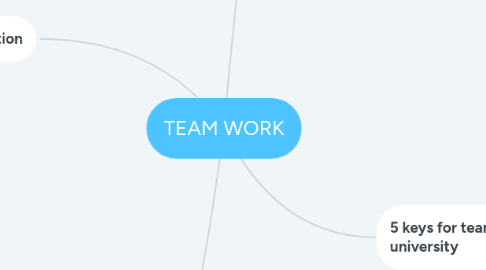
1. Meaning: Team's a group of people work together to achieve tasks
2. 5 keys for team skills at the university
2.1. Team development skills
2.1.1. Forming
2.1.1.1. make a group
2.1.1.1.1. Purpose & general direction
2.1.1.1.2. By a consultant
2.1.2. Storming
2.1.2.1. opinion
2.1.2.1.1. establish position
2.1.2.2. Discuss
2.1.3. Noming
2.1.3.1. General rules
2.1.3.1.1. Accept
2.1.3.1.2. Trust
2.1.3.1.3. Allocating
2.1.3.1.4. Decisions approved
2.1.3.1.5. Deadline expect
2.1.3.1.6. Meeting group
2.1.4. Performing
2.1.5. Adjouring
2.2. Group assignment: development subject & skills
2.2.1. List benefits
2.2.1.1. Large complex project
2.2.1.2. Information
2.2.1.3. Idea
2.2.1.4. Collaboration
2.2.1.5. Motivation
2.2.2. Tackling large complex project
2.2.2.1. Team get together
2.2.2.2. Brainstorm
2.2.2.3. intial idea research
2.2.2.4. Feedback
2.2.2.5. Drawn up plan & allocate tack
2.2.2.6. Work task
2.2.2.7. Monitoring
2.2.2.8. Teamwork event
2.2.2.9. Review perfomance
2.3. Developing social skills in team
2.3.1. Problem
2.3.1.1. Shy
2.3.1.2. Talk (idea, question)
2.3.1.3. Not listen
2.3.1.4. Aggresive
2.3.1.5. Language difficulties
2.3.1.6. Community of practice (encourage)
2.4. Develop self-concept through teams
2.4.1. Model of team roles (Belbin model)
2.4.1.1. 9 steps
2.4.1.1.1. Assess each person's
2.4.1.1.2. score, capacity
2.5. Developing coping skills through teams
2.5.1. Individual best => Not making successful company
2.5.2. Employees able to share
2.5.2.1. Acquired knowledge information can make successful company
3. Conflict resolution
3.1. Why consider conflict?
3.1.1. Corresponding personal skills
3.2. Mean by "conflict" in team (7 typical)
3.2.1. Different between individual or sub-groups
3.2.2. The present or formation of cliques
3.2.3. A desire to perform well as a team
3.2.4. Confusion or resentment allocated group roles
3.2.5. Different in perceived effort expended by individual members
3.2.6. Personality clashes
3.2.7. Cultural differences
3.3. Conflict resolution style
3.3.1. Win-win
3.3.2. Compromise
3.3.3. Win-lose
3.3.4. Agreeing to disagree
3.3.5. Giving around
3.3.6. Arbitration
3.4. Individual conflict
3.4.1. dilomacy
3.4.2. negotiation
3.4.3. creativity
3.4.4. communication
3.4.5. empathizing
3.4.6. listening
3.5. Team behavior to adopt
3.5.1. Communication
3.5.2. Openess - "no blame culture"
3.5.3. agree & move on - support
3.5.4. Celebrate success - yoy deserve it
4. cultural issues
4.1. working with order
4.1.1. people from other countries ( different culture)
4.2. the teacher is always right?
4.2.1. considered rule to ask teacher question
4.2.2. it will be necessary to take some bold step
4.2.2.1. ask question in class if you do not understand
4.2.2.2. be critical

